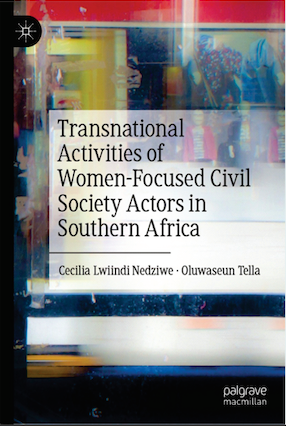By Aphiwe Ngowapi
Senior Lecturer at Rhodes University’s Politics and International Relations Department and book author Dr Cecilia Lwiindi Nedziwe’s latest book titled, Transnational Activities of Women-Focused Civil Society Actors in Southern Africa, is co-authored by Dr Oluwaseun Tella from the University of Johannesburg’s Institute for the Future of Knowledge.
The book was launched in September this year in the form of a panel discussion, which included discussants Prof Siphokazi Magadla and Refiloe Msibi at Rhodes University’s General Lecture Theatre. The debate was a convergence of scholarship, activism, and a burgeoning public interest in the role of civil society actors in advancing gender equality, migration, culture, and HIV/Aids interventions across the Southern African region. Dr. Nedziwe, a recognised expert in Southern African politics, has devoted years to researching the critical contributions of women-focused civil society actors in Southern Africa, and her book exemplifies this.
The moderator, Zikho Dana, stated: “Over time, we have seen and continue to see and be reminded that the challenges and insecurities that Africa has experienced and continues to experience require an active political commitment to finding the solution to these quagmires.”
The remarkably young audience was eager to hear Nedziwe’s perspectives. The book delves deeply into the often-underexplored activities of women-focused civil society organisations, offering a comprehensive understanding of their impact on the region’s politics, social fabric, and development.
Nedziwe was particular in highlighting the participants in the study. This approach was echoed throughout the evening as the audience was invited to interrogate the effects of commonly held beliefs about gender and sexual orientation on activism and policy. According to a participant in the study: ”The benefits of working on the regional project are to solve problems collectively to address issues like migration, HIV/Aids, culture, and patriarchy.”
Nedziwe’s own transnationalism is foregrounded in her work; she stated: “I come from a family that is transnational in nature; my father originally comes from Zimbabwe and my mother from Zambia, so it was during the Central African Federation in the early 1960s that my grandfather decided to move the whole family to Zambia.” The Central African Federation, then, was a union between Southern Rhodesia (Zimbabwe today), Northern Rhodesia (Zambia), and Nyasaland (Malawi). This was a colonial form of regional integration that was spearheaded by the Ian Smith government. Growing up with such a family exposed her to both Zambian and Zimbabwean cultures. Nedziwe speaks critically of the complex cross-border networks she witnessed her family members participating in. Not only are these complexities reflected in the differing laws regarding gender in the various countries regionally, but it is relatable to a Rhodes student community, of which 18% are international and familiar with the complications of a transnational experience.
In writing the book, Nedziwe says, “I wanted to draw in more experiences from the region”. Most International Relations literature or theory is state-centred, putting the state at the centre of theorising, with little research done in exploring the various transnational processes happening at a ground level in Southern Africa.
Magadla, Head of the Politics and International Studies Department at Rhodes University, noted that the book demonstrates how: “Institutions are made to care by women across time, across space.” The panel underscored the importance of recognising and amplifying the voices of women-focused civil society actors who continue to drive change in the Southern African region.



